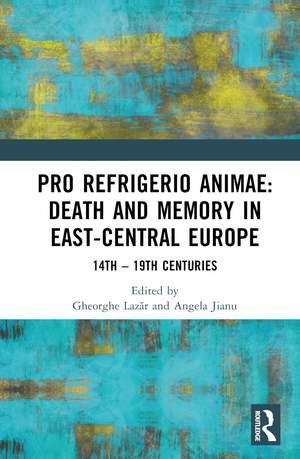Pro refrigerio animae: Death and Memory in East-Central Europe: Fourteenth-Nineteenth Centuries
Editat de Angela Jianu, Gheorghe Lazăren Limba Engleză Hardback – 4 aug 2023
This is an edited collection of studies by international scholars on the interlocking themes of attitudes and discourses on death, commemorative practices, and inheritance/testamentary strategies in the Balkans and East-Central Europe. These and other related themes are addressed comparatively and cover areas including Albania, Bulgaria, Romania, Greece, and areas of the former Yugoslavia, Hungary, and Austria from the perspective of imperial – Ottoman and Habsburg – legacies.
Pro refrigerio animae: Death and Memory in East-Central Europe contributes to this subject by: linking anthropological/religious/cultural approaches to death to the legal/economic aspects of inheritance/commemoration; adding a still absent East-Central European and Habsburg, Balkan, and Ottoman dimension to the study of death, memorialization, and testaments; and presenting an abundant primary and secondary material in English translation and thus placing research on death and testaments by East-Central and Greek scholars within the international scholarly circuit.
Preț: 1000.27 lei
Preț vechi: 1219.84 lei
-18% Nou
Puncte Express: 1500
Preț estimativ în valută:
191.40€ • 200.34$ • 159.31£
191.40€ • 200.34$ • 159.31£
Carte tipărită la comandă
Livrare economică 31 martie-14 aprilie
Preluare comenzi: 021 569.72.76
Specificații
ISBN-13: 9781032017457
ISBN-10: 1032017457
Pagini: 358
Ilustrații: 24 Halftones, black and white; 24 Illustrations, black and white
Dimensiuni: 156 x 234 x 21 mm
Greutate: 0.45 kg
Ediția:1
Editura: Taylor & Francis
Colecția Routledge
Locul publicării:Oxford, United Kingdom
ISBN-10: 1032017457
Pagini: 358
Ilustrații: 24 Halftones, black and white; 24 Illustrations, black and white
Dimensiuni: 156 x 234 x 21 mm
Greutate: 0.45 kg
Ediția:1
Editura: Taylor & Francis
Colecția Routledge
Locul publicării:Oxford, United Kingdom
Public țintă
Academic and PostgraduateNotă biografică
Angela Jianu studied English and classics at the University of Bucharest in Romania and obtained a PhD in history from the University of York (UK) in 2004. She currently works as an independent historian, copy editor, and translator. Her publications include: "Women, Fashion and Europeanisation in the Romanian Principalities," in Women in the Ottoman Balkans, eds. Amila Buturović and Irvin C. Schick (2007) (trans. into Turkish as Osmanlı Dőneminde Balkan Kadinlari, 2009); Earthly Delights – Economies and Cultures of Food in Ottoman and Danubian Europe, c. 1500-1900, eds. Angela Jianu and Violeta Barbu (Brill, Leiden, 2018).
Gheorghe Lazăr is a senior research fellow at the "Nicolae Iorga" Institute of History (Bucharest, Romania), co-editor (with Violeta Barbu) and coordinator of the collection of mediaeval documents Documenta Romaniae Historica B. Wallachia, published by the Romanian Academy (10 volumes, 1998–2016). He obtained a PhD in history at Laval-Québec University in 2005. His doctoral dissertation was published in 2006 as: Naissance et ascension d’une catégorie sociale: Les marchands en Valachie (XVIIe–XVIIIe siècles) (Romanian Academy Award 2008). His published works include edited documents of social, economic, and family history: Mărturie pentru posteritate: Testamentul negustorului Ioan Băluţă din Craiova (2010); Documente privitoare la negustorii din Ţara Românească, vol. 1 (1656–1688), vol. 2 (1689–1714) (2013, 2014); Testamente de negustori şi meşteşugari din Ţara Românească (secolele XVII-XIX), 2021.
Gheorghe Lazăr is a senior research fellow at the "Nicolae Iorga" Institute of History (Bucharest, Romania), co-editor (with Violeta Barbu) and coordinator of the collection of mediaeval documents Documenta Romaniae Historica B. Wallachia, published by the Romanian Academy (10 volumes, 1998–2016). He obtained a PhD in history at Laval-Québec University in 2005. His doctoral dissertation was published in 2006 as: Naissance et ascension d’une catégorie sociale: Les marchands en Valachie (XVIIe–XVIIIe siècles) (Romanian Academy Award 2008). His published works include edited documents of social, economic, and family history: Mărturie pentru posteritate: Testamentul negustorului Ioan Băluţă din Craiova (2010); Documente privitoare la negustorii din Ţara Românească, vol. 1 (1656–1688), vol. 2 (1689–1714) (2013, 2014); Testamente de negustori şi meşteşugari din Ţara Românească (secolele XVII-XIX), 2021.
Cuprins
1. Amila Buturovic, Death and Dying in Ottoman Bosnia: Cultural Responses, Before and After (1463-1878) / 2. Petronel Zahariuc, The Cult of the Dead in Moldavia (Seventeenth-Early Nineteenth Centuries): Between Liturgical Norm and Social Practice / 3. Gheorghe Lazăr, “The Last Passage”: Commemorative Discourse and Practices in the Testaments of Merchants (Wallachia, Eighteenth and Early Nineteenth Centuries) / 4. Zoran Ladić, From Fear of Death to the Salvation of the Soul and Eternal Life: Reasons for Composing Last Wills in the East Adriatic (Thirteenth-Fifteenth Centuries) / 5. Penka Danova and Elena Kostova, Demise Far from Home: Testaments of Ragusans Who Died in Bulgarian Lands in the Fourteenth and Fifteenth Centuries / 6. Konstantinos Giakoumis, "For a Christian Ending to Our Life": Church Endowments, Commemoration, and Tomb Purchases in the West Balkans (Fourteenth-Nineteenth Centuries) / 7. Elena Bedreag and Mihai Mîrza, Families without Children: Testamentary Norms and Practices among Moldavian Boyars (Seventeenth and Eighteenth Centuries) / 8. Mariana Lazăr, Strategies of Succession in the Testaments of the Cantacuzino Family (Wallachia, Seventeenth and Eighteenth Centuries) / 9. Mária Lupescu Makó, Between Material and Spiritual Memoria: Last Wills and Testaments in Late Medieval Transylvania (Fifteenth–Mid-Sixteenth Centuries) / 10. J.J. Łabno, Dead but not Departed: The Consolation of the Dangerous Gaze: Funerary Portraits in Early Modern Poland and Roman Egypt / 11. Aleksandra Koutny-Jones, Portraying the Dead in Early Modern Hungarian and Polish Funerary Traditions / 12. Maria Crăciun, “The Death of the Righteous”: Agency, Memory, Self-Representation, and Identity in Transylvanian Medieval Altarpieces / 13. Mihai-Bogdan Atanasiu, Moldavian Eighteenth-Century Diptychs: Prosopographic Sources for Social History / 14. Maria Magdalena Székely, Princely Necropoles of Moldavia (Fifteen-Sixteen Centuries) / 15. Ştefan S. Gorovei, Lost Monuments: The ‘Death’ of Family Necropoles in Medieval Moldavia
Descriere
This is an edited collection of studies by international scholars on the interlocking themes of attitudes and discourses on death, commemorative practices and inheritance/testamentary strategies in the Balkans and East-Central Europe.
